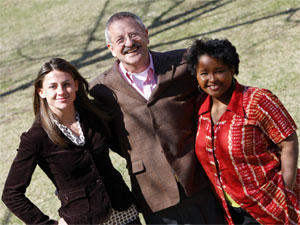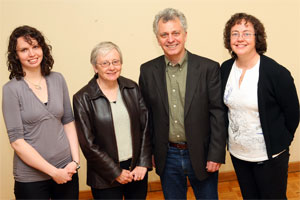 |
| Adrienne Power, John Swaine and Barb Hamilton-Hinch shared their experiences with participants at Defying the Odds, a symposium on student success. (Photo Nick Pearce Photo) |
Ever since she was a little girl, Adrienne Power “thought the world of Dalhousie” and never considered going anywhere else.
By the time she graduated with a Bachelor of Commerce degree, the academic achiever and varsity athlete had collected nine medals from national university competitions, including six gold. She made the Dean’s list and a co-op placement at the Atlantic Canada Opportunities Agency turned into a full-time job.
The 26-year-old sprinter who specializes in the 200 and 400 metres is now training in Baton Rouge, Louisiana with hopes of making it to the summer Olympics.
But when she first came to Dalhousie, the always-athletic Ms. Power stumbled. Coming from the rural community of East Jeddore/Oyster Pond, she was “intensely intimidated” by the other more worldly students she met and lost the confidence she had as a top student in high school.
“Here I was with all these textbooks and I was supposed to read a chapter a week—that’s like 250 pages a week and I don’t think I’d read 250 pages in my entire life,” said Ms. Power, one of three guest speakers who led off “Defying the Odds,” the symposium on student success on Monday, April 28.
Her accounting course was giving her trouble and she was struggling to organize her time to accommodate both athletics and academics. Pretty soon, track-and-field coach Dan Hennigar was giving her “talk,” “the so-Adrienne-let’s-talk-about-your-marks” talk.
Beginning university is not always easy; for many, it may be the most exciting, and most challenging, time of their life. Everything’s new: the independence, being away from home, keeping up with the workload and trying to figure out expectations.
With student stories as the framework, the symposium brought about 150 people from across campus to explore aspects of students’ experiences and needs. Break-out sessions in the morning focused on the obstacles faced by mature students, students from different cultural backgrounds and students with disabilities. In the afternoon, sessions turned to ways Dalhousie staff can offer help, by counselling stressed students or giving referrals to appropriate resources.
For Ms. Power, she felt capable of overcoming her hurdles after an interview for a co-op position gave her a burst of self-confidence that made her feel like her old self again.
Barb Hamilton-Hinch, the first of her family to go university and complete a degree, credits the encouragement she got from people along the way: Jerome Singleton, professor with the School of Health and Human Performance, who “helped me break the rules;” and Mayann Francis, the Lieutenant Governor of Nova Scotia, who “has always been in my corner.”
Now a clinical psychologist, John Swaine says an unswerving belief in his potential made all the difference in the world to him. After a “crash-and-burn” first year at university that served as his wake-up call, he was supported by his family back in Yarmouth when he decided he’d like to continue and from a come-from-away professional couple in Yarmouth, a psychologist and a screenwriter, “who saw things in me that I didn’t see in myself.”
"My teachers told me I was lazy, that I wasn't working to my potential," says Dr. Swaine, who believes he might have had Attention Deficit Disorder brought on by a bump on the head during a sliding accident when he was in Grade 2. "And when I came to university, I didn't know how to organize myself ... I couldn't focus. And it didn't help that I lived in the most social room of my floor (in residence.)"

